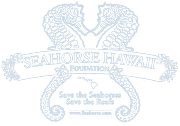Ocean Rider Seahorse Farm and Tours | Kona Hawaii › Forums › Seahorse Life and Care › Hyoid bone erosion
- This topic has 2 replies, 3 voices, and was last updated 1 year, 3 months ago by elonmatt5.
-
AuthorPosts
-
January 17, 2023 at 1:04 pm #87549bdgrandtParticipant
Have now a 2nd tigertail that had her hyoid bone pop through her the skin under her jaw, what causes this and can it heal? My first one just got a weaker snick over time and died
ThanksJanuary 17, 2023 at 2:46 pm #87729Pete GiwojnaModeratorDear BD:
I’m very sorry to hear that another of your tiger tail seahorses (Hippocampus comes) has developed a health problem.
It’s difficult to say what is causing the tissue erosion exposing the hyoid bone “trigger mechanism” that enables seahorses to slurp up frozen Mysis or live foods, resulting in weak snick. But my best bet is that it’s an infection of some sort, either protozoan parasites such as Uronema or a bacterial infection of some sort.
Weak snick and associated treating problems such as sticky trigger or trigger lock are notoriously difficult to treat and resolve because they have many different causes. For example, they can result from protozoan parasites such as Uronema infesting the gills and buccal cavity of the seahorse, including the esophagus, and triggering an inflammatory response and possible secondary bacterial infections.
Or weak snick can be the direct result of bacteria invading the gills, buccal cavity/esophagus and digestive tract of the seahorses, or directly attacking the muscles that operate the musculature that generate the suction when the seahorse is feeding. These bacteria can be the result of either a primary or secondary infection and the irritation and inflammation they cause and the damage they can do to the affected tissues results in the loss of suction (bacterial enteritis and/or branchitis).
Or weak snick can also be the result of a muscular strain or a mechanical injury, which further complicates the picture.
So we customarily address weak snick by performing a freshwater dip or bath followed by treatment with good antiparasitics to address the possibility that it is being caused by protozoan parasites. Hyposalinity or osmotic shock therapy is another way to counter such protozoans.
And to address the possibility that primary or secondary bacterial infections are the culprit, we also treat weak snick using broad-spectrum antibiotics, preferably administered orally if the seahorse is still eating adequately.
One of the keys to treating weak snick successfully is to keep the seahorse eating one way or another so that it can keep its strength up until it can heal up and recover or the attempted treatments can take effect. Providing easy-to-swallow enriched adult brine shrimp is one way to help assure that the affected seahorse is getting adequate nutrition…
Unfortunately, it is frequently not possible to pinpoint a specific cause for a given case of weak snick until the affected seahorse has expired and you can perform a necroscopic examination using multiorgan histopathology.
The following Fish Vet video on YouTube will explain more about the sort of bacterial infections that can cause problems with weak snick, and that may have been responsible for the tissue erosion that cause the hyoid bone to be exposed:
Seahorse with bacterial enteritis and branchitis.
https://youtu.be/cG7C4BEY7EgIn my experience, it is unlikely the affected seahorse will be able to heal and recover. In order to do so, he would first need to successfully treat the presumed bacterial infection and resulting inflammation that are most likely causing the weak snick in your case, BD.
Best of luck resolving this unfortunate affliction.
Respectfully,
Pete Giwojna, Ocean Rider Tech SupportApril 11, 2023 at 8:38 am #89617elonmatt5ParticipantThere are several health problems that seahorses may experience, some of which are related to their unique physiology and behavior. Some of the common health issues that seahorses face include:
Stress: Seahorses are sensitive creatures, and stress can weaken their immune system and make them more vulnerable to diseases.
Respiratory problems: Seahorses have a specialized respiratory system that can be easily affected by poor water quality or lack of oxygen in their environment. They may experience respiratory distress or even suffocation if their water conditions are not optimal.
Digestive issues: Seahorses have a long digestive tract that is prone to blockages and constipation. This can be caused by inadequate feeding, poor water quality, or stress.
Fungal and bacterial infections: Like all aquatic creatures, seahorses can be susceptible to various bacterial and fungal infections, particularly if their water conditions are poor.
Parasites: Seahorses may also be affected by various parasites such as copepods, worms, and flukes, which can cause significant health problems.
Physical injuries: Seahorses can easily become injured, particularly if they are kept in tanks with other aggressive fish. Injuries can range from minor abrasions to more serious wounds that require veterinary attention.
It is important to provide seahorses with a clean and healthy environment, a well-balanced diet, and regular check-ups with a veterinarian specializing in aquatic animals to ensure that they remain healthy and happy.
-
AuthorPosts
- You must be logged in to reply to this topic.





